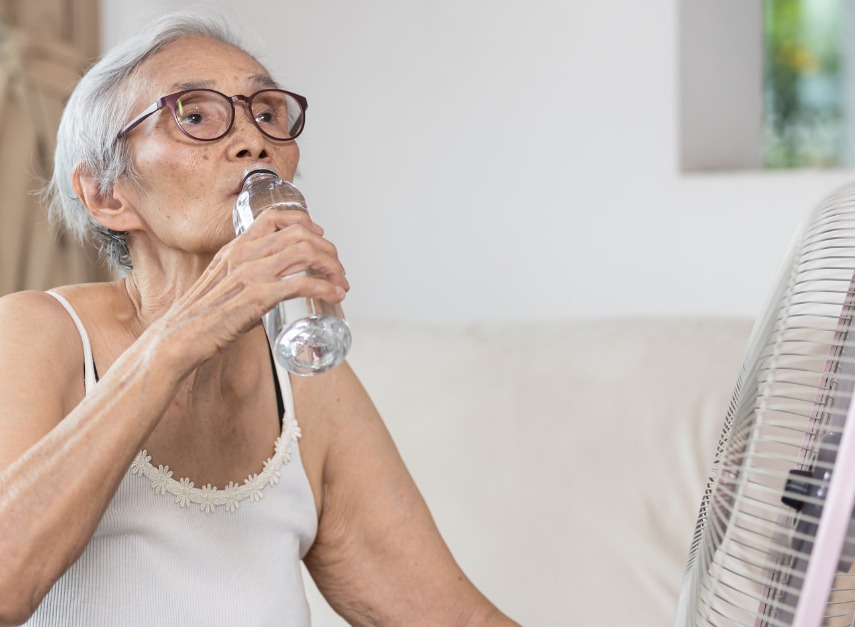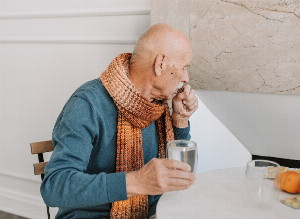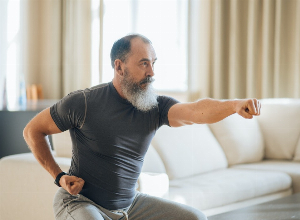COPD and heatwave: what can you do to manage better?
Published Aug 10, 2024 • By Claudia Lima
A person suffering from chronic obstructive pulmonary disease (COPD) is particularly vulnerable to weather changes, especially heat waves. These extreme conditions can aggravate respiratory symptoms and increase the risk of complications.
What is COPD? What can you do to manage your COPD during heat waves more effectively and minimize the risks to your health?
Find all the answers in our article!

What is COPD?
Chronic obstructive pulmonary disease (COPD) is a chronic respiratory disease characterized by persistent obstruction of the airways.
The main symptoms include:
- Difficulty breathing,
- Shortness of breath,
- Chronic cough,
- Excessive mucus production.
The course of COPD is punctuated by exacerbations, or flare-ups - periods of time when symptoms become worse.
The main causes of this respiratory disease are active and passive smoking, exposure to pollutants, genetic inheritance, and the consequences of certain illnesses (lung cancer, cardiovascular disease, drug addiction, HIV, anorexia). In the US, more than 14 million people are diagnosed with COPD.
Treatments include bronchodilators, inhaled steroids and rehabilitation.
Hot weather can have significant impact on people with COPD.
How does hot weather affect people with COPD?
When you suffer from a chronic respiratory condition, such as chronic obstructive pulmonary disease (COPD), breathing requires a lot of energy. In hot weather, the body expends more energy to maintain its internal temperature around 98.6°F, which can have consequences for the body.
To maintain a normal temperature and function properly, the human body has to cool itself by eliminating heat. Under normal circumstances, the cooler air outside helps to reject this heat. In hot weather, there are three main mechanisms that increase the body's cooling efficiency:
- Breathing via exhalation,
- Perspiration via sweat,
- Dilation of blood vessels under the skin.
These mechanisms consume energy and also lead to a loss of essential vitamins and minerals. Heat can cause exhaustion, loss of appetite, headaches, risk of dehydration, confusion and even heat stroke.
It can also worsen COPD symptoms such as breathlessness, which can be due to:
- Dehydration: excessive sweating leads to fluid loss and causes dehydration, which worsens respiratory symptoms.
- Air pollution: high temperatures increase the concentration of pollutants and allergens in the air, exacerbating COPD symptoms,
- Heat stress: the body has to work harder to maintain a stable internal temperature, which can be additionally tiring to COPD patients.
How can you protect yourself from the heat if your have COPD?
Keep the cool temperature in your house
- Close your shutters, curtains and windows during the day, and air out at night whenever possible,
- Use household appliances at night,
- Avoid using halogen lights,
- Do not leave appliances in standby mode,
- Use air conditioning without creating too great a difference between the inside and outside temperatures.
Get organized with your daily life and with your exercise
- Avoid going out during the hottest hours (between 11am and 4pm). Opt for outdoor activities in the early morning or after 8pm,
- Limit strenuous physical activities,
- Ask those around you for help with shopping and other daily tasks.
Protect yourself from sunlight and heat
- Drink a lot of water, at least 1.5 to 2 liters a day,
- Dampen your clothes and regularly wet your neck, face, forearms and feet,
- Keep a spray bottle nearby.
Stick to healthy diet
- Eat in sufficient quantities,
- Opt for fruit and vegetables,
- Avoid alcohol and diuretic drinks.
Wear suitable clothes
- Choose loose-fitting, comfortable clothes made of cotton, silk or linen,
- Choose light-colored clothes.
Be on the lookout for signs of a flare-up
- Speak to your doctor or pharmacist if in doubt,
- Keep emergency numbers at hand,
- Always have your medicines at hand and know what to do in case of emergency.
Do not forget
Extreme heat represents a major risk for people with COPD, but with proper preparation, it is possible to minimize this risk and get through the heatwave more serenely.
Staying hydrated, avoiding strenuous exercise and maintaining a cool environment are all key to effective protection.

 Facebook
Facebook Twitter
Twitter


